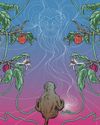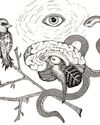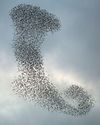
The Stoic philosophers, who flourished in the Graeco-Roman world between the third century BCE and the fourth century CE, were profoundly interested in the natural world, and considered science essential knowledge for a philosopher. It’s likely that a Stoic time traveller, transported into the early 21st century, would initially hesitate to believe that humans could remake the climate of the Earth and in doing so threaten the future of the entire biosphere. I think we can be confident, however, that once presented with the scientific evidence our devotee of Hellenic reason would embrace the consensus and agree we are facing an incomprehensibly dangerous emergency.
It is now widely agreed in the scientific community that we are in the midst of the sixth mass extinction event in Earth’s history – and that this one has been triggered by human activity. Due to the way we live, much of the biodiversity of the world has disappeared over the last hundred years, and more of it will go in the next hundred. At the end of 2018 the Living Planet Index of the World Wildlife Fund reported that from 1970 to 2014 there was a 60% decline in the overall numbers of mammals, birds, reptiles, amphibians and fish. Another recent report, published in the journal Biological Conservation (Vol. 232, April 2019), found that more than 40% of the world’s insect species are dramatically declining and a third are endangered – risking what the report’s authors call a “catastrophic collapse of nature’s ecosystems.”
Denne historien er fra February/March 2020-utgaven av Philosophy Now.
Start din 7-dagers gratis prøveperiode på Magzter GOLD for å få tilgang til tusenvis av utvalgte premiumhistorier og 9000+ magasiner og aviser.
Allerede abonnent ? Logg på
Denne historien er fra February/March 2020-utgaven av Philosophy Now.
Start din 7-dagers gratis prøveperiode på Magzter GOLD for å få tilgang til tusenvis av utvalgte premiumhistorier og 9000+ magasiner og aviser.
Allerede abonnent? Logg på

Anselm (1033-1109)
Martin Jenkins recalls the being of the creator of the ontological argument.

Is Brillo Box an Illustration?
Thomas E. Wartenberg uses Warhol's work to illustrate his theory of illustration.

Why is Freedom So Important To Us?
John Shand explains why free will is basic to humanity.

The Funnel of Righteousness
Peter Worley tells us how to be right, righter, rightest.

We're as Smart as the Universe Gets
James Miles argues, among other things, that E.T. will be like Kim Kardashian, and that the real threat of advanced AI has been misunderstood.

Managing the Mind
Roger Haines contemplates how we consciously manage our minds.

lain McGilchrist's Naturalized Metaphysics
Rogério Severo looks at the brain to see the world anew.

Love & Metaphysics
Peter Graarup Westergaard explains why love is never just physical, with the aid of Donald Davidson's anomalous monism.

Mary Leaves Her Room
Nigel Hems asks, does Mary see colours differently outside her room?

From Birds To Brains
Jonathan Moens considers whether emergence can explain minds from brains.